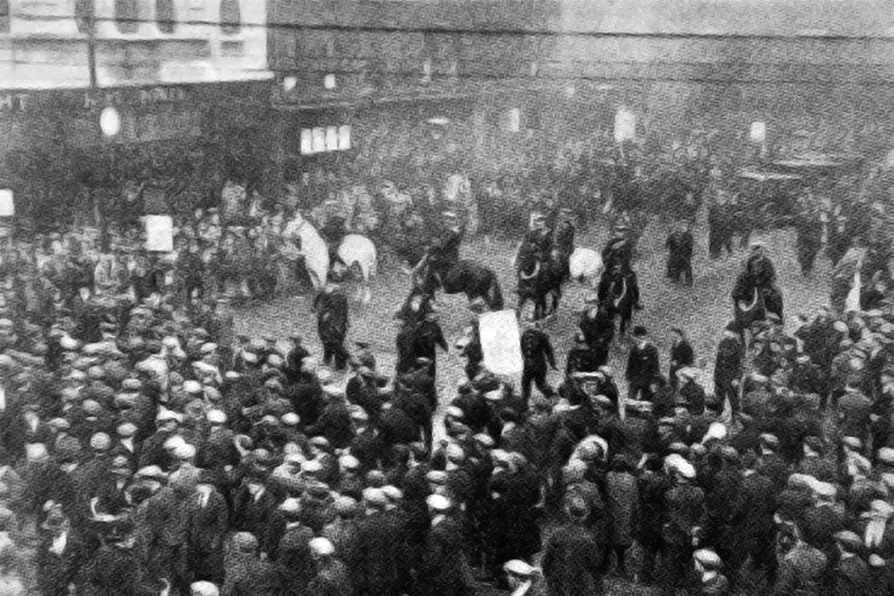The Morning Star sorts the good eggs from the rotten scoundrels of the year just gone
MAT COWARD looks back to a 1931 protest against mass unemployment featuring a young Ewan MacColl

 Police battle with workers in Bexley Square, Salford, October 1, 1931
Police battle with workers in Bexley Square, Salford, October 1, 1931
HOW did they tell people about a forthcoming demonstration in the days when there was no internet or mobile phones, and most people didn’t have a landline?
The answer — at least, in Salford in 1931 — was apparently something called bluemould, “a porous chalk-like substance which housewives used to brighten up their window sills and doorsteps.”
That’s according to legendary folk singer Ewan MacColl (or Jimmy Miller as he was then), and he would know since he was one of the local teenage activists tasked with alerting residents to a planned anti-poverty protest by chalking the details on walls all over town.
(Which reminds me of a story comedy writer Spike Milligan used to tell about how, as a young communist, he’d been sent out painting anti-fascist slogans on walls at night — only to discover in the morning that he’d been using white paint on white walls.)
Along with bluemould and whitewash, which announced the October 1 1931 demo on countless walls and buildings throughout the city of Salford, MacColl and some other unemployed comrades formed the Red Megaphones, an agitprop street theatre group which toured the district to whip up support.
These methods obviously worked: on the day, 10,000 people gathered with the intention of marching to the town hall in Bexley Square where the council was due to vote on welfare cuts.
Unemployment levels in 1931, following capitalism’s near collapse in 1929, were extremely high — especially in industrial areas, and especially outside the summer months, when seasonal work ended. At the time of this demonstration it’s likely that in some districts of Salford male unemployment was around 30 per cent.
Predictably, as the economy withered, national governments and local councils thought it would be for the best if the poorest people became even poorer. This would make the rich richer, which in turn would lead to a refloating of the financial system and then everything would be fine again.
The unemployed of Salford were unconvinced by this logic, and the demonstration’s demands included no cuts to unemployment benefit, free milk for the under-fives, abolition of the means test, no wage cuts for teachers and other council employees, and free coal during winter for impoverished households.
Surrounded by police, and tempoed by a drummer and a handbell-ringer, the great procession set off. (The man with the bell was a big bloke, “well muscled and with the strength of a young lion,” who died fighting the fascists in Spain.) Their chants included “Down! Down! Down with the national starvation government!”
Almost immediately, the police tried to divert the demo from its planned route by blocking a turning. But as one of the many memoirs of that day records, “We went through them like a knife through soft putty. I remember my head going down as if in a rugby scrum. With the pressure from our comrades behind, we pushed them to one side quite easily.”
And so the first skirmish in “the Battle of Bexley Square” was easily won by the people. That wasn’t the end of the matter, though.
As the marchers approached the town hall, the police again tried to force them off course. As fighting broke out, mounted police — who had until that moment been hidden behind the town hall — charged the protesters, followed by plain-clothes officers, batons swinging. One newspaper noted that “the whole area resounded with booing, screaming and hissing.”
“Down with the cossacks,” people cried, as the sticks and boots broke bones and spilt blood indiscriminately. The workers fought back — even press reports hostile to the demonstrators noted that six coppers were needed to effect each arrest — but peaceful, hungry marchers had little chance against planned, disciplined, armed violence. Some were dragged inside the town hall to be given a proper beating.
As so often in such cases, it was the beaten who were subsequently put on trial rather than the beaters. Edmund Frow — who with his wife Ruth went on to found the Working Class Movement Library — was one of those charged with assaulting the police. In a later account of the events, he gave this wry assessment of the prosecution’s evidence: “A collection of brick-bats, hammer heads, assorted pieces of iron, spanners and broken bottles was displayed and it looked as if all the scrap-yards of Manchester and Salford had been combed by the police.”
Several men were imprisoned, some with hard labour, but similar protests took place around the country, and must certainly have helped lead to the massive reform of welfare provision that took place after the 1945 election.
As for bluemould (or bluemold), I haven’t been able to find any other references to it, and would love to know what it was and whether that’s the right name. Could it be something to do with scrubbing with skimmed milk, which according to English Heritage was a Victorian technique for cleaning flagstones?
You can sign up for Mat Coward’s Rebel Britannia Substack at www.rebelbrit.substack.com for more strange strikes, peculiar protests, bizarre boycotts, unusual uprisings and different demos.










